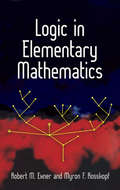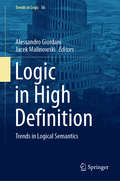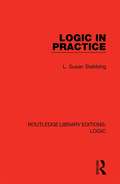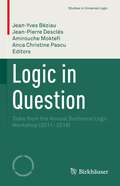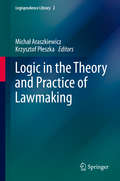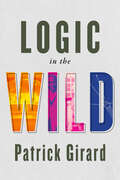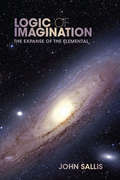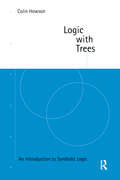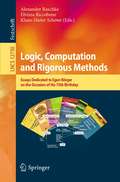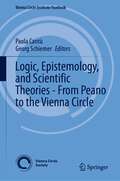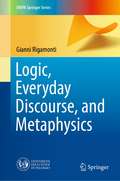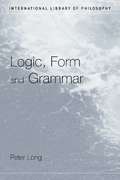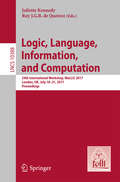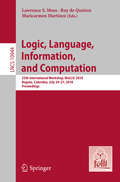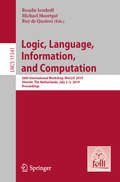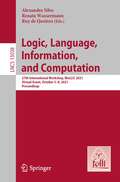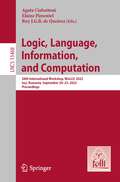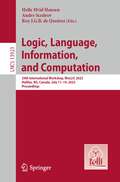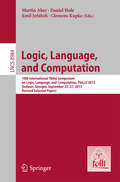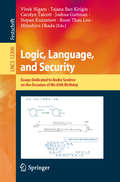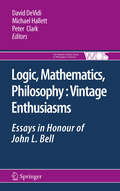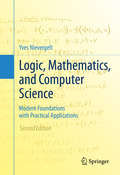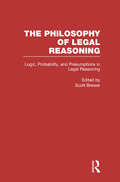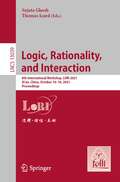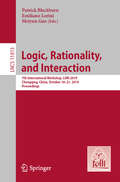- Table View
- List View
Logic in Elementary Mathematics (Dover Books on Mathematics)
by Robert M. Exner Myron F. RosskopfThis applications-related introductory treatment explores facets of modern symbolic logic useful in the exposition of elementary mathematics. The authors convey the material in a manner accessible to those trained in standard elementary mathematics but lacking any formal background in logic. Topics include the statement calculus, proof and demonstration, abstract mathematical systems, and the restricted predicate calculus. The final chapter draws upon the methods of logical reasoning covered in previous chapters to develop solutions of linear and quadratic equations, definitions of order and absolute value, and other applications. Numerous examples and exercises aid in the mastery of the language of logic.
Logic in High Definition: Trends in Logical Semantics (Trends in Logic #56)
by Jacek Malinowski Alessandro GiordaniThis volume clusters together issues centered upon the variety of types of intensional semantics. Consisting of 10 contributions, the volume is based on papers presented at the Trends in Logic 2019 conference. The various chapters introduce readers to the topic, or apply new types of logical semantics to elucidate subtleties of logical systems and natural language semantics.The book introduces hyperintentional systems that aim at solving some open philosophical problems. Specifically, the first three studies focus on relating semantics, while the following ones discuss fundamental issues related to hyper-intensional semantics or develop hyper-intensional frameworks to address issues in modal, epistemic, deontic and action logic. Authors in this volume present original results on logical systems but also extend beyond this by offering philosophical considerations on the topic as well. This volume will appeal to students and researchers in the field of logic.
Logic in Practice (Routledge Library Editions: Logic)
by L. Susan StebbingOriginally published in 1934. This fourth edition originally published 1954., revised by C. W. K. Mundle. "It must be the desire of every reasonable person to know how to justify a contention which is of sufficient importance to be seriously questioned. The explicit formulation of the principles of sound reasoning is the concern of Logic". This book discusses the habit of sound reasoning which is acquired by consciously attending to the logical principles of sound reasoning, in order to apply them to test the soundness of arguments. It isn’t an introduction to logic but it encourages the practice of logic, of deciding whether reasons in argument are sound or unsound. Stress is laid upon the importance of considering language, which is a key instrument of our thinking and is imperfect.
Logic in Question: Talks from the Annual Sorbonne Logic Workshop (2011- 2019) (Studies in Universal Logic)
by Jean-Yves Béziau Amirouche Moktefi Jean-Pierre Desclés Anca Christine PascuThis contributed volume collects papers related to the Logic in Question workshop, which has taken place annually at Sorbonne University in Paris since 2011. Each year, the workshop brings together historians, philosophers, mathematicians, linguists, and computer scientists to explore questions related to the nature of logic and how it has developed over the years. As a result, chapter authors provide a thorough, interdisciplinary exploration of topics that have been studied in the workshop. Organized into three sections, the first part of the book focuses on historical questions related to logic, the second explores philosophical questions, and the third section is dedicated to mathematical discussions. Specific topics include:• logic and analogy• Chinese logic• nineteenth century British logic (in particular Boole and Lewis Carroll)• logical diagrams • the place and value of logic in Louis Couturat’s philosophical thinking• contributions of logical analysis for mathematics education• the exceptionality of logic• the logical expressive power of natural languages• the unification of mathematics via topos theoryLogic in Question will appeal to pure logicians, historians of logic, philosophers, linguists, and other researchers interested in the history of logic, making this volume a unique and valuable contribution to the field.
Logic in the Theory and Practice of Lawmaking
by Michał Araszkiewicz Krzysztof PłeszkaThis book presents the current state of the art regarding the application of logical tools to the problems of theory and practice of lawmaking. It shows how contemporary logic may be useful in the analysis of legislation, legislative drafting and legal reasoning concerning different contexts of law making. Elaborations of the process of law making have variously emphasised its political, social or economic aspects. Yet despite strong interest in logical analyses of law, questions remains about the role of logical tools in law making. This volume attempts to bridge that gap, or at least to narrow it, drawing together some important research problems--and some possible solutions--as seen through the work of leading contemporary academics. The volume encompasses 20 chapters written by authors from 16 countries and it presents diversified views on the understanding of logic (from strict mathematical approaches to the informal, argumentative ones) and differentiated choices concerning the aspects of law making taken into account. The book presents a broad set of perspectives, insights and results into the emerging field of research devoted to the logical analysis of the area of creation of law. How does logic inform lawmaking? Are legal systems consistent and complete? How can legal rules be represented by means of formal calculi and visualization techniques? Does the structure of statutes or of legal systems resemble the structure of deductive systems? What are the logical relations between the basic concepts of jurisprudence that constitute the system of law? How are theories of legal interpretation relevant to the process of legislation? How might the statutory text be analysed by means of contemporary computer programs? These and other questions, ranging from the theoretical to the immediately practical, are addressed in this definitive collection.
Logic in the Wild
by Patrick GirardIs logic a good tool for making decisions? Can it make us better listeners and help us find coherence in views that we disagree with? Is Sherlock Holmes actually good at logic?Patrick Girard addresses these and other questions by presenting logic as the guardian of coherence. Logic, Girard argues, finds coherence in the patterns of reasoning across science, religion, and everyday decision making. It helps communities engage safely by replacing contentious debates with shared, constructive reasoning – logic provides neutral ground for the healthy pursuit of common goals and interests. Logic in the Wild employs common sense language, eschewing technical jargon, symbols, and equations. Girard’s attention focuses on logic’s power to find what unites the complex and the simple, the abstract and the concrete, the theoretical and the practical.In treating logic not as a passive subject to learn but as an active discipline to engage with, Logic in the Wild teaches us to identify patterns in our own reasoning, which inevitably helps us better confront questions central to everyday life.
Logic of Imagination
by John SallisThe Shakespearean image of a tempest and its aftermath forms the beginning as well as a major guiding thread of Logic of Imagination. Moving beyond the horizons of his earlier work, Force of Imagination, John Sallis sets out to unsettle the traditional conception of logic, to mark its limits, and, beyond these limits, to launch another, exorbitant logic--a logic of imagination. Drawing on a vast range of sources, including Plato, Aristotle, Kant, Hegel, Nietzsche, and Freud, as well as developments in modern logic and modern mathematics, Sallis shows how a logic of imagination can disclose the most elemental dimensions of nature and of human existence and how, through dialogue with contemporary astrophysics, it can reopen the project of a philosophical cosmology.
Logic with Trees: An Introduction to Symbolic Logic
by Colin HowsonFirst published in 1997. Routledge is an imprint of Taylor & Francis, an informa company.
Logic, Computation and Rigorous Methods: Essays Dedicated to Egon Börger on the Occasion of His 75th Birthday (Lecture Notes in Computer Science #12750)
by Klaus-Dieter Schewe Alexander Raschke Elvinia RiccobeneThis Festschrift was published in honor of Egon Börger on the occasion of his 75th birthday.It acknowledges Prof. Börger's inspiration as a scientist, author, mentor, and community organizer. Dedicated to a pioneer in the fields of logic and computer science, Egon Börger's research interests are unusual in scope, from programming languages to hardware architectures, software architectures, control systems, workflow and interaction patterns, business processes, web applications, and concurrent systems.The 18 invited contributions in this volume are by leading researchers in the areas of software engineering, programming languages, business information systems, and computer science logic.
Logic, Epistemology, and Scientific Theories - From Peano to the Vienna Circle (Vienna Circle Institute Yearbook #29)
by Georg Schiemer Paola CantùThis book provides a collection of chapters on the development of scientific philosophy and symbolic logic in the early twentieth century. The turn of the last century was a key transitional period for the development of symbolic logic and scientific philosophy. The Peano school, the editorial board of the Revue de Métaphysique et de Morale, and the members of the Vienna Circle are generally mentioned as champions of this transformation of the role of logic in mathematics and in the sciences. The scholarship contained provides a rich historical and philosophical understanding of these groups and research areas. Specifically, the contributions focus on a detailed investigation of the relation between structuralism and modern mathematics. In addition, this book provides a closer understanding of the relation between symbolic logic and previous traditions such as syllogistics. This volume also informs the reader on the relation between logic, the history and didactics in the Peano School. This edition appeals to students and researchers working in the history of philosophy and of logic, philosophy of science, as well as to researchers on the Vienna Circle and the Peano School.
Logic, Everyday Discourse, and Metaphysics (UNIPA Springer Series)
by Gianni RigamontiThis book applies the formal discipline of logic to everyday discourse. It offers a new analysis of the notion of individual, suggesting that this notion is linguistic, not ontological, and that anything denoted by a proper name in a well-functioning language game is an individual. It further posits that everyday discourse is non-compositional, i.e., its complex expressions are not just the result of putting simpler ones together but react on the latter, modifying their meaning through feedback. The book theorizes that in everyday discourse, there is no algebra of truth values, but the latter can be both input and output of something which has no truth value at all. It suggests that an elementary proposition of everyday discourse (defined as having exactly one predicate) can, in principle, be indefinitely expanded by adding new components, belonging neither to subject nor to predicate, but remain elementary. This book is of interest to logicians and philosophers of language.
Logic, Form and Grammar (International Library of Philosophy)
by Peter LongThis work contains Peter Long's important essay, Logic, Form and Grammar, which resolves many difficulties for the logical form of an argument where the reasoning is hypothetical. Also included are two essays on classical problems in philosophical logic, relating to logical form and formal relations. All of the essays provide clear thinking and philosophical explanations, overturning many unchallenged suggestions in philosophical logic.
Logic, Language, Information, and Computation
by Juliette Kennedy Ruy J. G. B. QueirozEdited in collaboration with FoLLI, the Association of Logic, Language and Information this book constitutes the refereed proceedings of the 21st Workshop on Logic, Language, Information and Communication, WoLLIC 2014, held in Valparaiso, Chile, in September 2014. The 15 contributed papers presented together with 6 invited lectures were carefully reviewed and selected from 29 submissions. The focus of the workshop was on the following subjects Inter-Disciplinary Research involving Formal Logic, Computing and Programming Theory, and Natural Language and Reasoning.
Logic, Language, Information, and Computation: 25th International Workshop, WoLLIC 2018, Bogota, Colombia, July 24-27, 2018, Proceedings (Lecture Notes in Computer Science #10944)
by Ruy De Queiroz Lawrence S. Moss Maricarmen MartinezEdited in collaboration with FoLLI, the Association of Logic, Language and Information this book constitutes the refereed proceedings of the 25th Workshop on Logic, Language, Information and Communication, WoLLIC 2018, held inBogota, Colombia, in July 2018. The 16 full papers together with 3 short papers and 3 invited talks presented were fully reviewed and selected from 30 submissions. The vision for the conference is to provide an annual forum which is large enough to provide meaningful interactions between logic and the sciences related to information and computation.
Logic, Language, Information, and Computation: 26th International Workshop, WoLLIC 2019, Utrecht, The Netherlands, July 2-5, 2019, Proceedings (Lecture Notes in Computer Science #11541)
by Ruy De Queiroz Rosalie Iemhoff Michael MoortgatEdited in collaboration with FoLLI, the Association of Logic, Language and Information this book constitutes the refereed proceedings of the 26th Workshop on Logic, Language, Information and Communication, WoLLIC 2019, held in Utrecht, The Netherlands, in July 2019. The 41 full papers together with 6 invited lectures presented were fully reviewed and selected from 60 submissions. The idea is to have a forum which is large enough in the number of possible interactions between logic and the sciences related to information and computation, and yet is small enough to allow for concrete and useful interaction among participants.
Logic, Language, Information, and Computation: 27th International Workshop, WoLLIC 2021, Virtual Event, October 5–8, 2021, Proceedings (Lecture Notes in Computer Science #13038)
by Ruy De Queiroz Alexandra Silva Renata WassermannEdited in collaboration with FoLLI, the Association of Logic, Language and Information this book constitutes the refereed proceedings of the 27th Workshop on Logic, Language, Information and Communication, WoLLIC 2021, Virtual Event, in October 2021. The 25 full papers presented included 6 invited lectures were fully reviewed and selected from 50 submissions.The idea is to have a forum which is large enough in the number of possible interactions between logic and the sciences related to information and computation.
Logic, Language, Information, and Computation: 28th International Workshop, WoLLIC 2022, Iași, Romania, September 20–23, 2022, Proceedings (Lecture Notes in Computer Science #13468)
by Agata Ciabattoni Elaine Pimentel Ruy J. G. B. de QueirozEdited in collaboration with FoLLI, the Association of Logic, Language and Information this book constitutes the refereed proceedings of the 28th Workshop on Logic, Language, Information and Computation, WoLLIC 2022, Iasi, Romania, in September 2022. The 25 full papers presented included with 8 extra abstracts, 5 invited talks and 3 tutorials were fully reviewed and selected from 46 submissions. The conference aims fostering interdisciplinary research in pure and applied logic.
Logic, Language, Information, and Computation: 29th International Workshop, WoLLIC 2023, Halifax, NS, Canada, July 11–14, 2023, Proceedings (Lecture Notes in Computer Science #13923)
by Helle Hvid Hansen Andre Scedrov Ruy J.G.B. de QueirozEdited in collaboration with FoLLI, the Association of Logic, Language and Information this book constitutes the refereed proceedings of the of the 29th International Workshop on Logic, Language, Information, and Computation, WoLLIC 2023, held in Halifax, NS, Canada, during July 11–14, 2023. The 24 full papers (21 contributed, 3 invited) included in this book were carefully reviewed and selected from 46 submissions. The book also contains the abstracts for the 7 invited talks and 4 tutorials presented at WoLLIC 2023. The WoLLIC conference series aims at fostering interdisciplinary research in pure and applied logic.
Logic, Language, and Computation
by Martin Aher Daniel Hole Emil Jeřábek Clemens KupkeThis book constitutes the refereed proceedings of the 10th International Tbilisi Symposium on Logic, Language and Computation, TbiLLC 2013, held in Gudauri, Georgia, in September 2013. The conference series is centered around the interaction between logic, language and computation. The contributions represent these three fields and the symposia aim to foster interaction between them. The book consists of 16 papers that were carefully reviewed and selected from 26 submissions. Each paper has passed through a rigorous peer-review process before being accepted for publication. The volume also contains two summaries of the tutorials that took place at the symposium: the one on admissible rules and the one on the formal semantics of aspectual meaning from a cross-linguistic perspective.
Logic, Language, and Security: Essays Dedicated to Andre Scedrov on the Occasion of His 65th Birthday (Lecture Notes in Computer Science #12300)
by Carolyn Talcott Vivek Nigam Tajana Ban Kirigin Joshua Guttman Stepan Kuznetsov Boon Thau Loo Mitsuhiro OkadaThis Festschrift was published in honor of Andre Scedrov on the occasion of his 65th birthday. The 11 technical papers and 3 short papers included in this volume show the many transformative discoveries made by Andre Scedrov in the areas of linear logic and structural proof theory; formal reasoning for networked systems; and foundations of information security emphasizing cryptographic protocols. These papers are authored by researchers around the world, including North America, Russia, Europe, and Japan, that have been directly or indirectly impacted by Andre Scedrov. The chapter “A Small Remark on Hilbert's Finitist View of Divisibility and Kanovich-Okada-Scedrov's Logical Analysis of Real-Time Systems” is available open access under a CC BY 4.0 license at link.springer.com.
Logic, Mathematics, Philosophy, Vintage Enthusiasms
by Peter Clark David Devidi Michael HallettThe volume includes twenty-five research papers presented as gifts to John L. Bell to celebrate his 60th birthday by colleagues, former students, friends and admirers. Like Bell's own work, the contributions cross boundaries into several inter-related fields. The contributions are new work by highly respected figures, several of whom are among the key figures in their fields. Some examples: in foundations of maths and logic (William Lawvere, Peter Aczel, Graham Priest, Giovanni Sambin); analytical philosophy (Michael Dummett, William Demopoulos), philosophy of science (Michael Redhead, Frank Arntzenius), philosophy of mathematics (Michael Hallett, John Mayberry, Daniel Isaacson) and decision theory and foundations of economics (Ken Bimore). Most articles are contributions to current philosophical debates, but contributions also include some new mathematical results, important historical surveys, and a translation by Wilfrid Hodges of a key work of arabic logic.
Logic, Mathematics, and Computer Science
by Yves NievergeltThis text for the first or second year undergraduate in mathematics, logic, computer science, or social sciences, introduces the reader to logic, proofs, sets, and number theory. It also serves as an excellent independent study reference and resource for instructors. Adapted from Foundations of Logic and Mathematics: Applications to Science and Cryptography © 2002 BirkhÓ"user, this second edition provides a modern introduction to the foundations of logic, mathematics, and computers science, developing the theory that demonstrates construction of all mathematics and theoretical computer science from logic and set theory. The focuses is on foundations, with specific statements of all the associated axioms and rules of logic and set theory, and provides complete details and derivations of formal proofs. Copious references to literature that document historical development is also provided. Answers are found to many questions that usually remain unanswered: Why is the truth table for logical implication so unintuitive? Why are there no recipes to design proofs? Where do these numerous mathematical rules come from? What issues in logic, mathematics, and computer science still remain unresolved? And the perennial question: In what ways are we going to use this material? Additionally, the selection of topics presented reflects many major accomplishments from the twentieth century and includes applications in game theory and Nash's equilibrium, Gale and Shapley's match making algorithms, Arrow's Impossibility Theorem in voting, to name a few. From the reviews of the first edition: ". . . All the results are proved in full detail from first principles. . . remarkably, the arithmetic laws on the rational numbers are proved, step after step, starting from the very definitions!. . . This is a valuable reference text and a useful companion for anybody wondering how basic mathematical concepts can be rigorously developed within set theory. " --MATHEMATICAL REVIEWS "Rigorous and modern in its theoretical aspect, attractive as a detective novel in its applied aspects, this paper book deserves the attention of both beginners and advanced students in mathematics, logic and computer sciences as well as in social sciences. " --Zentralblatt MATH
Logic, Probability, and Presumptions in Legal Reasoning: A Collection Of Essays By Philosophers And Legal Scholars: Logic, Probability, And Presumptions In Legal Reasoning (Philosophy of Legal Reasoning: A Collection of Essays by Philosophers and Legal Scholars #No. 1)
by Scott BrewerAt least since plato and Aristotle, thinkers have pondered the relationship between philosophical arguments and the "sophistical" arguments offered by the Sophists -- who were the first professional lawyers. Judges wield substantial political power, and the justifications they offer for their decisions are a vital means by which citizens can assess the legitimacy of how that power is exercised. However, to evaluate judicial justifications requires close attention to the method of reasoning behind decisions. This new collection illuminates and explains the political and moral importance in justifying the exercise of judicial power.
Logic, Rationality, and Interaction: 8th International Workshop, LORI 2021, Xi'ian, China, October 16-18, 2021, Proceedings (Lecture Notes in Computer Science #13039)
by Sujata Ghosh Thomas IcardThis LNCS book is part of the FOLLI book series and constitutes the proceedings of the 8th International Workshop on Logic, Rationality, and Interaction, LORI 2021, held in Xi`an, China, in October 2021.The 15 full papers presented together with 7 short papers in this book were carefully reviewed and selected from 40 submissions. The workshop covers a wide range on the following topics such as doxastic and epistemic logics, deontic logic, intuitionistic and subsstructural logics, voting theory, and (a new theme emphasized this year) causal inference.
Logic, Rationality, and Interaction: 7th International Workshop, LORI 2019, Chongqing, China, October 18–21, 2019, Proceedings (Lecture Notes in Computer Science #11813)
by Patrick Blackburn Emiliano Lorini Meiyun GuoThis LNCS book is part of the FOLLI book series and constitutes the proceedings of the 7th International Workshop on Logic, Rationality, and Interaction, LORI 2019, held in Chongqing, China, in October 2019.The 31 papers presented in this book were carefully reviewed and selected from 56 submissions. They focus on the following topics: agency; argumentation and agreement; belief revision and belief merging; belief representation; cooperation; decision making and planning; natural language; philosophy and philosophical logic; and strategic reasoning.
